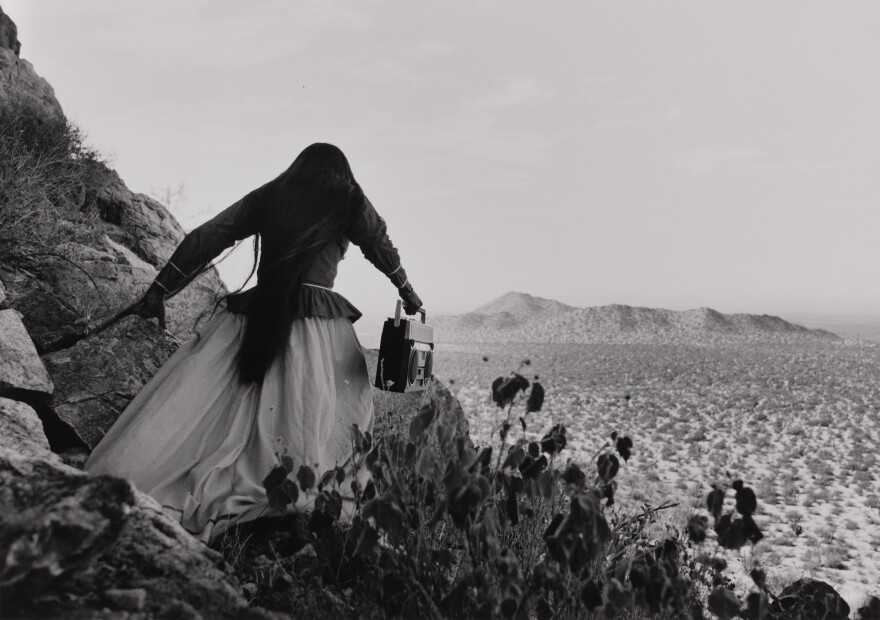"There's so much beauty in Mexico, we often get obsessed with other countries," says Graciela Iturbide, one of Latin America's most renowned photographers.
For Iturbide, it's a lesson she has grown to appreciate over a career that has spanned half a century. In that time, the image maker has used her camera as her excuse to get to understand the intricacies of the world, spending most of her life traveling through it.
Iturbide was born in Mexico City in 1942. She set out to be a film director, enrolling at the Centro de Estudios Cinematográficos at the Universidad Nacional Autónoma de México at the age of 27. But while traveling with her mentor, the Mexican modernist Manuel Alvarez Bravo, she realized how drawn she was to photography and travel.

One of Iturbide's most famous photographs, Mujer Ángel (Angel Woman) has graced the walls of every living space that Felix Contreras, host of NPR's Alt.Latino, has occupied since he bought it at a San Francisco museum sometime in the 1980's.
"Her work has been an inspiration for me and has brought me closer to my own cultural heritage with every viewing," he says.
Iturbide took Mujer Ángel in the Sonora Desert in 1979. The image captures a young Seri indigenous woman, with her hair down and a long dress, seemingly ready to launch herself in flight across the desert.


What's most fascinating about the image is the cultural prop the woman is carrying with her: a boombox. It's an example of a common feature of Iturbide's work — the inclusion of some sort of symbol or artifact that makes one wonder whether that one thing belongs in the image or if it's an element of our imagination, or is it hers?

This mix between what's real and what's not in Mujer Ángel is what makes Iturbide's work on Mexico so culturally enchanting. Like every image, it evokes a magical mix between tradition encased in a deeply surreal, nearly electronic ambient sound collage where anything could happen.
This body of work reveals an entire plethora of scenes from Mexico's strikingly diverse landscapes, peoples and intricacies. Her approach to photography, even after 50 years, is one that has helped her standout from the canon of other photographers.

At the center of this approach is empathy above all else. Iturbide uses her camera as a tool to see the humanity of Mexicans — something that is often overshadowed by current news and events.
It's a point that Iturbide spoke about with Contreras on a recent episode of Alt.Latino, as she lamented the hardships that have driven many Mexicans to leave home in search of the American dream.
![Left: <em>Our Lady of the Iguanas</em>. Right: <em>Sahuaro [Saguaro].</em>](https://npr.brightspotcdn.com/dims4/default/0bf412e/2147483647/strip/true/crop/1713x1054+0+0/resize/880x541!/quality/90/?url=https%3A%2F%2Fmedia.npr.org%2Fassets%2Fimg%2F2020%2F09%2F29%2Fiturbide-1_custom-b43cdea2954005c49202348f786b202b0f131103.jpg)

"For us Mexicans, there is no American dream," she says. "This is our fault, because we don't create opportunities here in Mexico. Crossing the border is hard, life is really hard for migrants. So we need to educate ourselves as Mexicans, create jobs in Mexico, for people to stay here."
"There's so much Mexico has to offer," says Iturbide. "There is no need to pursue the American dream. We have our own here, too."

Copyright 2023 NPR. To see more, visit https://www.npr.org.



